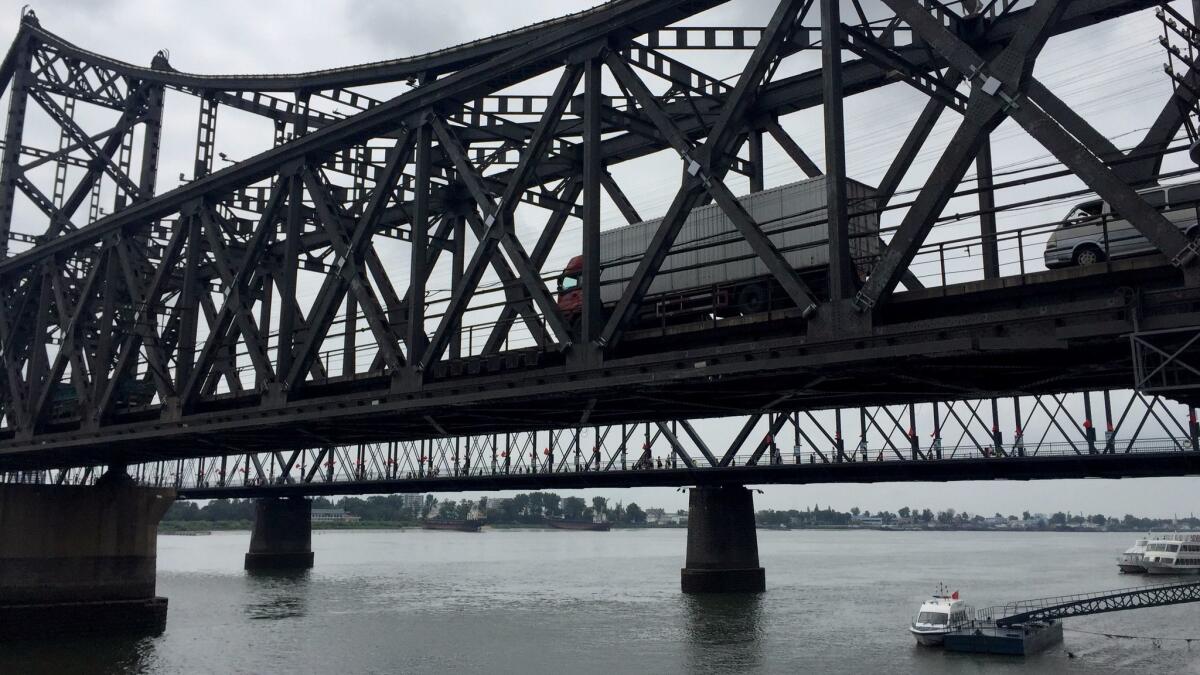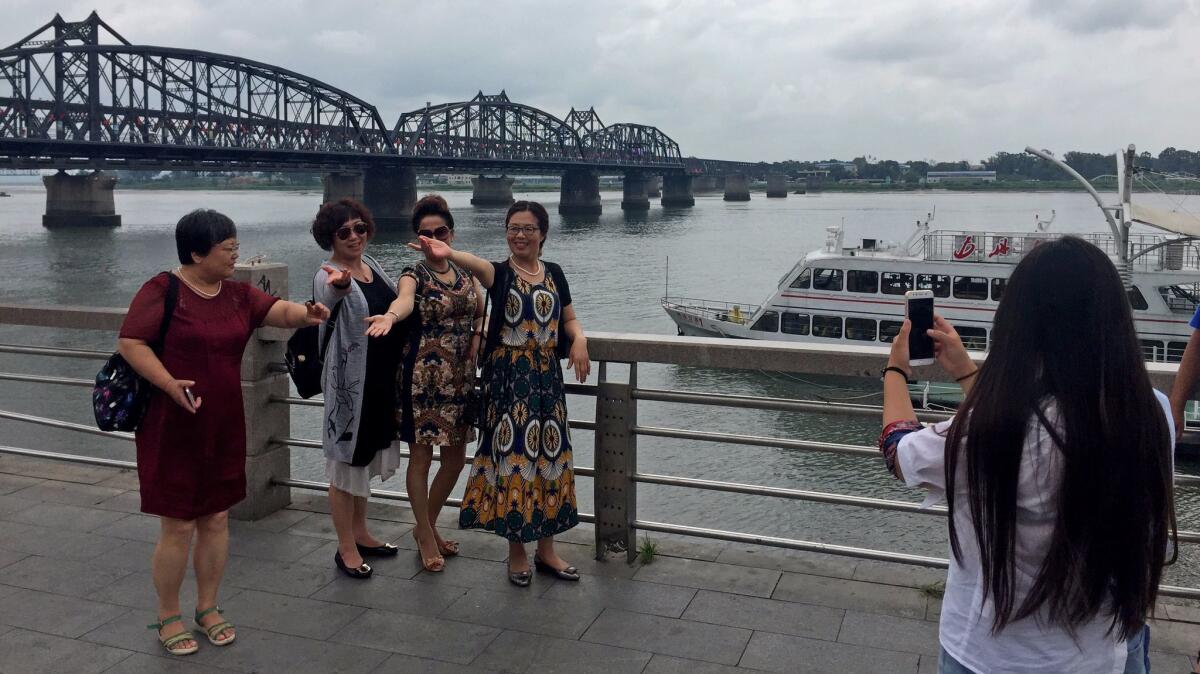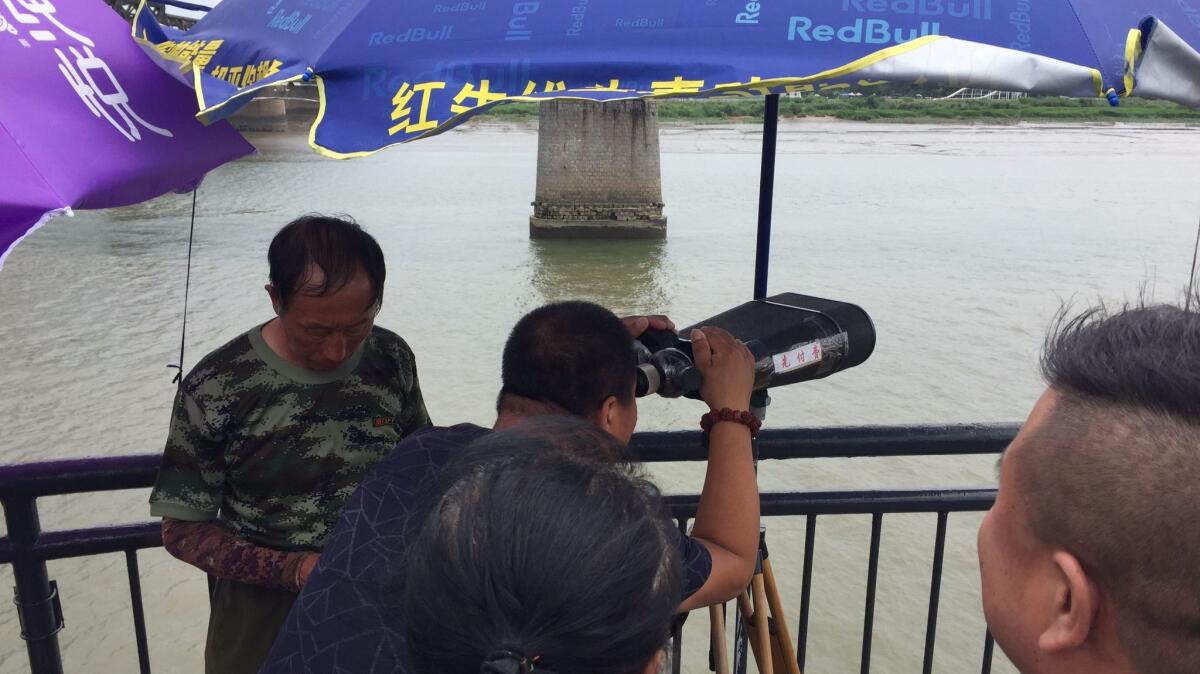To make North Korean sanctions stick, the ‘gloves are off’ for U.S. in fight against Chinese smugglers

Reporting from Dandong, China — Cai didn’t know what he was bringing into North Korea, and he didn’t dare ask.
Whenever the 49-year-old truck driver crossed the bridge into North Korea, the cargo was carefully wrapped so he couldn’t see what was inside.
For all he knew, the packages contained agricultural tools, baby clothes, umbrellas, food, rice cookers or toaster ovens. Or they might have contained materials for making nuclear bombs.
His boss was a well-dressed, well-spoken woman, Ma Xiaohong, who he said “had a special connection with the Chinese government.”
“I started to suspect she was doing illegal trading,” said Cai, who asked to be quoted only by his surname because of the sensitivity of the situation. After six months driving in 2015, he quit.
His suspicions were confirmed when Ma and three associates were indicted in September in U.S. District Court in Newark, N.J., on charges of conspiracy to evade sanctions against North Korea.
Her company, Dandong Hongxiang (the latter part of the name translates to “Flying High”), at one point handled an estimated 20% of North Korea’s trade with China, according to company documents filed with the court.
Ma since has disappeared and is unlikely to stand trial, given the lack of an extradition treaty with China, but the charges have effectively closed her operation.
Borrowing a technique used against suppliers to the Iranian nuclear program, the U.S. government filed an unusual petition seeking forfeiture of at least $1.9 million from an affiliated company, Mingzheng International, through Chinese banks that do business in the United States.
“It is a novel approach that underscores the U.S. commitment to target the illicit North Korean trade,” said Aaron Arnold, a former advisor to the FBI on nonproliferation, who refers to the tactic as “weaponizing the courts.” While the U.S. government previously has been reluctant to go after Chinese companies and banks for fear of retaliation against U.S. companies working with China, he said, that has changed. “Now, from what I understand, the gloves are off.”
The case is likely to be a template for future government action against North Korea with the hope that lawsuits and sanctions — a safer course than military action — can slow the North Koreans’ completion of a weapon that can reach the United States. The Trump administration has been scrambling to respond to North Korea, which since June has conducted two tests of intercontinental ballistic missiles capable of reaching the United States.
A tough new sanctions resolution unanimously approved Aug. 5 by the U.N. Security Council bars North Korea from exporting $1 billion of its most profitable commodities, including coal. On Monday, China announced that it would ban imports of North Korean coal, iron and lead ores, and seafood, beginning Sept. 5. Yet, as with past sanctions, their bite will depend on how thoroughly the Chinese enforce them.
In the past, sanctions have been largely ineffective because they targeted only North Koreans, not Chinese and others — such as Malaysians and Singaporeans — who have helped North Korea buy what it needs.
“The Chinese economy is a globalized marketplace. Anything the North Koreans want, they can procure within the Chinese market,” said John Park, an expert in Chinese-North Korean trade at Harvard University.
China accounts for 90% of North Korea’s trade volume. Dandong looms large in this equation. The city of 2.4 million is the largest on the 850-mile border between China and North Korea and was the crossing point when Chinese communist troops came across the Yalu River during the Korean War.
Like other Chinese cities today, it has been transformed by a pell-mell of glitzy high-rises and shopping malls. It draws Chinese tourists who stroll on a riverfront promenade, gawking at a country across the way that looks frozen in an earlier era — with dingy mid-rises, a few rusty cargo ships, a Ferris wheel that never revolves. Visitors buy nostalgic souvenirs, North Korean currency, traditional North Korean dresses and North Korean liquor, beer, pickled eggs.

Meanwhile, elite North Koreans come to Dandong’s upscale Mirador International Mall to buy 18-karat gold jewelry, Bose stereo speakers and Gucci fashions.
“North Korea is just like any country. There are haves and have-nots,” said a Gucci agent, who asked not to be identified. “Many of them speak Chinese.”
Most of the trade runs across the Sino-Korean Friendship Bridge, but some takes place on the river. “People smuggle iron, copper, even flour” across the border, said a longtime Dandong trader.
“Sometimes, we’ll see small boats from North Korea. If they’re running out of petrol, they’ll ask this side to give them more petrol.”
But that’s only for the small players. The serious trading is carried out by large government-owned North Korean trading companies that operate with greater sophistication.
North Korea “is flouting sanctions through trade in prohibited goods, with evasion techniques that are increasing in scale, scope and sophistication,” reported the U.N. Panel of Experts, which oversees the enforcement of sanctions against North Korea. The panel said that North Korea is “using agents who are highly experienced and well-trained in moving money, people and goods, including arms and related materials, across borders.”
Of the various networks spread through Asia and Europe that have helped the North Koreans, none did as much business as the enterprise operated by Ma Xiaohong.
Ma got her start in the 1990s when the North Korean economy was imploding and the country was plagued with famine. Like other Chinese business people, she bought scrap metal from North Koreans who were dismantling factories in order to buy food, according to a report in the Chinese-language Southern Weekly newspaper. She eventually forged ties with senior North Korean officials, among them Jang Song Taek, the uncle of Kim Jong Un who was purged and executed in 2013.
Ma was hardly a shadowy player in Dandong. She was a well-known businesswoman who had served on the Liaoning provincial legislature and was active in the Communist Party. She had a taste for publicity, as is evident from glossy corporate brochures and a self-published magazine in which she struck glamorous poses. In a rough-and-tumble part of China (the northeast is famous for its gruff manner of speaking), Ma stood out.
“My first impression of her was that she was really well-mannered, really well-educated, really polite, but really authoritative as well,” said Cai, the truck driver.
By 2010, the company boasted in a PowerPoint presentation that it accounted for a stunning 20% of the trade between China and North Korea, a claim that could not be independently verified. It had five ships registered in Hong Kong that transited regularly between northern China and the North Korean port of Nampo. The company advertised itself on its website as “a bridge between DPRK [North Korea] and the world.”
Dandong Hongxiang would buy commodities from North Korea — coal being the largest — and then use the proceeds to buy whatever the North Koreans needed. But trading with North Korea became increasingly perilous with tightening international and U.S. sanctions. “Business risks come with sensitive North Korean situation,” the PowerPoint presentation acknowledged.
The indictment alleges that Ma set up a series of front companies scattered from the British Virgin Islands to the Seychelles and Hong Kong — Success Target Group, Best Famous Ltd., Flying Horse and Beauty Chance are just a few — to disguise illegal trade with the North Koreans.

Chinese authorities closed down Dandong Hongxiang’s operations last year after the company was flagged by U.S. intelligence.
“They did act against this network, but only after the United States issued sanctions,” said Anthony Ruggiero, a former Treasury Department official now at the Foundation for Defense of Democracies. “There is really no evidence that China has cracked down on the trade relationship with North Korea.”
Others are more optimistic.
“There are only a limited number of players bringing money into the financial system. If you are able to shut them down, you can have a disproportionate impact on their business,” said David Thompson, an analyst with the Center for Advanced Defense Studies.
Although Hongxiang’s headquarters — a sprawling office on the 16th floor of the Sun Fortune Center office building, just across from the river promenade in Dandong — was shuttered, at least three of the company’s subsidiaries are still operating. These include a travel agency bringing Chinese tourists to North Korea, a restaurant and a cargo firm where half a dozen people still work.
“We’re doing foreign trade; we’re an agency,” said one female employee, before she stormed off into another room and refused to say more.
[email protected] | @BarbaraDemick
Gaochao Zhang and Nicole Liu in The Los Angeles Times’ Beijing bureau contributed to this report.
ALSO
North Korean ruler stands down on threat to Guam, but could change his mind ‘if the Yankees persist’
One-armed bandits hit the savanna: Inside the Chinese-led gambling epidemic in rural Ghana
More to Read
Sign up for Essential California
The most important California stories and recommendations in your inbox every morning.
You may occasionally receive promotional content from the Los Angeles Times.










